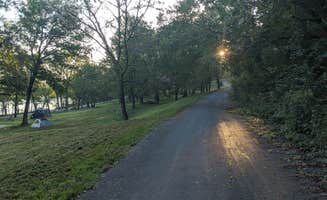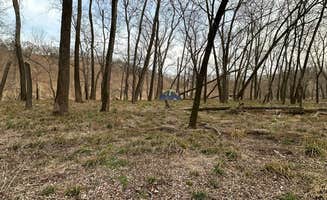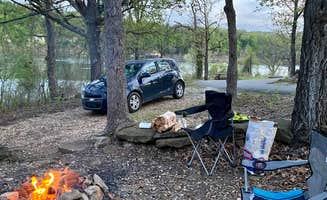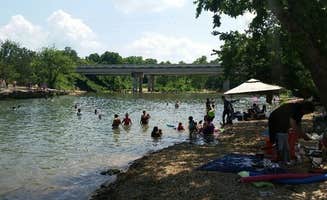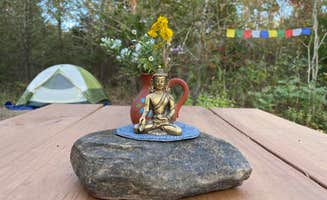Tent campsites near Wagoner, Oklahoma cluster around Fort Gibson Lake and Lake Tenkiller. The area features rolling hills with elevations ranging from 550 to 750 feet above sea level, creating diverse waterfront camping experiences. Seasonal water level fluctuations affect campsite availability, particularly during spring when higher water levels can reduce beach camping options.
What to do
Kayaking opportunities: Horseshoe Bend Primitive Public Use Area provides direct access to the Illinois River. "The river is narrow at this point, moving but not at a fast pace. Kayakers put in and paddle upstream and float back to boat landing," notes a camper.
Scuba diving excursions: Eagles Point at Lake Tenkiller offers clear water conditions for underwater exploration. "The water was really clean and clear," reports one visitor, making it ideal for both swimming and diving activities.
Wildlife observation: Bird watching is particularly productive at primitive sites. "It is a bird watcher's paradise, and we saw a lot of people fishing. I was able to see multiple species of Oklahoma's woodpeckers, some birds of prey, and many songbirds," explains a visitor to Horseshoe Bend.
Creek exploration: Smaller water features offer intimate nature experiences. At Gates Nature Preserve, campsites are positioned "right next to the creek" according to a visitor who praised the "lovely" morning walks past "a herd of adorable cows."
What campers like
Affordability: Free camping options exist with reasonable stay limits. A camper at Jackson Bay Recreation Area notes, "Amazing free campground, you can stay here for 14 days. No amenities, but it's well taken care of."
Morning views: Lakeside locations provide scenic sunrise opportunities. "Beautiful view over the lake at sunrise!" reports a Jackson Bay Recreation Area visitor, highlighting the natural reward for those who select water-adjacent sites.
Hiking access: Several campgrounds feature trail networks for day exploration. One visitor to Elephant Rock Nature Park praised the "beautiful breathtaking views" and called it a "Great hiking area" with "Awesome senary."
Seclusion options: Even during busy periods, quieter camping can be found. "This state park is LARGE. The plus to that is despite busy holiday weekends, spring flooding or special event weekends, you can always find a place to pitch a tent," explains a visitor to Eagles Point.
What you should know
Road conditions: Several primitive camping areas require careful driving assessment. "The dirt road was rough... keep going straight and veer off to the right onto a dirt road along the river / lake," advises a Horseshoe Bend visitor who recommends bringing a "4x4, and check the weather."
Camping regulations: Rules change periodically at certain locations. "This is a great area by the river... but were politely told by a game warden the next day that, though it used to be open for that, it is no longer allowed. It is open to the public only during the day," notes a recent visitor to Horseshoe Bend.
Pack-out requirements: Most primitive tent sites require complete waste removal. "No Trash cans means more responsibility," cautions a Jackson Bay Recreation Area visitor who found "a mound of trash near the exit" despite the area being "pretty clean."
Seasonal considerations: Water levels and road conditions vary throughout the year. Flooding impacts site availability, particularly in spring months when lower elevation sites may become submerged at Eagles Point where a camper noted "despite busy holiday weekends, spring flooding or special event weekends, you can always find a place to pitch a tent."
Tips for camping with families
Safety awareness: Local wildlife requires appropriate precautions. "Be aware rattlesnakes also enjoy the area," warns a camper at Eagles Point, while another visitor to Horseshoe Bend mentions "snakes like to hide out in them (I think it's cool to find them but most probably won't) they won't bother you."
Facility selection: Choose campsites with necessary amenities for children. "Our little campsite was so cozy with a table, a fire pit and a grill," shares a Gates Nature Preserve visitor, highlighting the basic conveniences available at some locations.
Activity planning: Build in structured activities for younger campers. "Kid friendly area," notes a visitor to Elephant Rock Nature Park who suggests "Bigfoot looking!!" as a playful activity to engage children during hikes.
Proximity to supplies: Consider distance to essential services. "There's a Dollar general not far," mentions an Eagles Point camper, noting the practicality of having supplies within reach when camping with families.
Tips from RVers
Site selection strategy: RV campers should assess campground layout before selecting spots. "This campground has easy, level sites at a nice angle, so you aren't facing right at the back of someone else's trailer," advises a visitor to Sequoyah Bay State Park Campground.
Waterfront considerations: Premium sites require navigation trade-offs. "We did see some sites near the water that looked tricky to get into, but you'd be right by the water, so that's the trade off," explains a Sequoyah Bay visitor.
Dump station access: Some campgrounds provide convenient waste disposal. "The host was friendly and helpful, dump sites easy to manage," reports a camper at Sequoyah Bay State Park, highlighting an essential service for extended RV stays.


